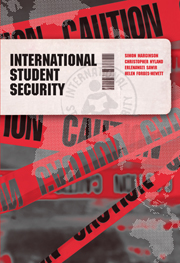PART 3 - Security in the informal and private domain
Published online by Cambridge University Press: 05 August 2012
Summary
INTRODUCTION TO PART 3: THE INFORMAL AND PRIVATE DOMAIN
In the security of international students, the formal domain of policy and regulation is ordered by the legal compacts between government and education institution, and education institution and student. As discussed in part 2 it is in the formal domain that recognised policy issues of student security such as housing and health care are played out. But as noted in part 1, beyond the formal domain of international education lies another domain, equally important to student security. That is the informal domain, larger and more complex than the formal domain, more shadowy in a public sense but more familiar in students’ own lives. The informal domain begins with the semi-formal relations between education institution and student, inside and outside the classroom, that contour student life. Beyond the institutions is the world of intimate family and student households and networks of friends, religious observance, sport and arts and clubs and advocacy groups. While the formal domain is largely invariant and standardised, the informal domain is different for each person. It is always changing, shaped by students’ successive encounters with authority and each other, with local people and life on the street. It is also the domain of the private self, of thoughts and sensibilities, feelings and imaginings. Though most of the informal domain is visible to provider institutions, this solely private space is normally invisible.
The informal domain is not recognised by policy or regulation except as personal details on file, but it is essential to students and to the care of students. Student security is advanced in the informal domain. It can also be lost.
- Type
- Chapter
- Information
- International Student Security , pp. 263 - 270Publisher: Cambridge University PressPrint publication year: 2010



